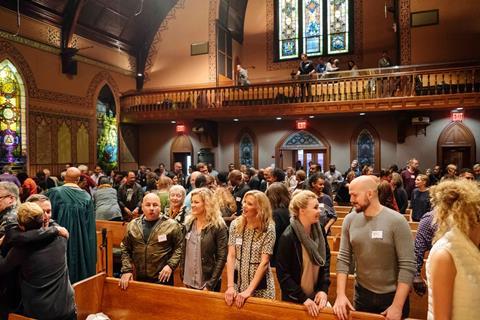Millennials aren’t done with Jesus but Jean Kabasomi says many are being made to feel like an afterthought by the Church. It’s time to move them from the benches and back onto the field before a whole generation slips away

Last month, I went to our annual church conference, camp, holiday (insert the correct word for your setting). As expected, it was great! I was challenged, met with the Lord, engaged a little bit more with my church community, laughed, cried, prayed, lost my voice, went to bed late, woke up early and…. slept in a tent (a first and probably last for me, although it was far more enjoyable than I thought it would be).
One session really got me thinking. The speaker gave a fantastic talk about the glory of God. I was reminded to look for and expect the glory of God evidenced by signs and wonders through my life.
However, throughout the sermon, I couldn’t help thinking, “She isn’t really talking to me.” I am sure that wasn’t her intention, but the framing of the sermon gave the impression it was directed at two groups of people:
-
The John generation — Gen Z or those in their 20s, who had beheld the glory of God.
-
The Moses generation — middle-aged, people over 50 or heading towards their “second mountain”, who had seen the glory before and wanted to see it again.
There was no reference to people like me – millennials or Gen X (people in their 30s and 40s). As I sat there, I recalled two questions I have been asking myself for the last two years. When did, and why has, the Church stopped speaking to millennials?
Now, you might be thinking maybe it’s just me. I am exaggerating. It really isn’t that deep. But I don’t think it’s just me. During that talk, I sat next to one of my friends, who recently turned 30, a younger millennial or a “zillennial” as they are sometimes called.
At one point, the speaker said, “You will climb your second mountain.” My friend, who had just turned 30, put her hand up and said, “Amen.” I whispered to her, “She wasn’t talking to you.”
The Church’s blind spot
After the sermon, I spoke to her again. I explained that just because she had turned 30 didn’t mean she had “passed it”. Her life wasn’t over. She hadn’t missed her calling. My exact words were, “How can it be that in January, when you were 29, you were the future of the Church, and now, seven months later in July, because you’ve turned 30, you’re approaching your second mountain? Does that even make sense?”
She agreed that it was nonsense. But the truth is that is how I think the Church is making people in their 30s (and 40s — I’m not Gen X, so this is an assumption) feel. We are the has-beens. It feels like we are being told, “God is answering our prayers through Gen Z and Alpha, so we don’t need you as much.”
This conversation stuck with me throughout the conference. So, I decided to arrange a chat with one of the clergy in our church to brainstorm ideas about engaging millennials. When I approached him, he was happy to schedule some time to chat with me. But he automatically assumed I wanted to speak to him about Gen Z.
We have a very straight-talking relationship, so I said to him, “To be very honest, I think there are enough people in the Church interested in engaging and discipling Gen Z, my concern is millennials. I think we are being ignored.” He replied, “I hear what you are saying, I see it in my old church.”
I recently spoke to another millennial friend about her church’s summer conferences. She informed me that nothing had been arranged for her age group. Instead, there had been conferences for the youth (13-18 years), Gen Alpha and adults between 18-30.
Her exact words were, “They aren’t really interested in millennials. They will call us when it’s time to go to the beach or have a BBQ.” It was a joke. We both laughed but acknowledged the sadness of it all. At the time when we have the most strength and capital, millennials are being ignored by the Church.
Confusions and contradictions
Two years ago, at another Christian conference, I heard a statement by a millennial pastor that made me think.
I agreed with it at the time and it has since changed my behaviour because there is some truth to what he said. But I also think it ignores how the Church has treated those of us who grew up in its walls over the last 20 years.
The pastor said the difference between millennials and Gen Z is that millennials complain about all the problems that they see in the Church, while Gen Z just get on with fixing things.
It’s true, millennials do talk a lot. But what is often forgotten is the advice we were given when we tried to solve problems.
In our late teens and 20s we were told to sit down and wait for our time to come.
“You can’t be on social media in this way, it’s worldly. Light has no fellowship with darkness.”
“Who gave you the authority to teach? You can’t have a YouTube channel or podcast. That is not how things are done.”
“You need to serve, support and learn. You have to develop character.”
All well-meaning, I think. Yet some of these statements curtailed our creativity, drive and passion for the Church. Many millennials have become disenfranchised and switched off from the Church. Not from Jesus, but from engaging, serving and working in the Church.
That’s why you still see us around. We still love Jesus, still believe in the gospel, still believe in the Bible but you will only see us on Sundays or at BBQs.
What makes it worse is even if you are still interested, wanting to serve more, it seems as though the Church is indifferent to you.
Confusingly for us, because of modern medical advances, the people who were in charge of the Church when we were younger are now looking at doing second, third or even fourth mountains, when some of us haven’t even started our first mountain despite serving for years.
At the same time, those younger than us are doing and saying things that we were not allowed to do. In some instances, we were rebuked and punished, while they are now being elevated and celebrated for their boldness in doing exactly the same things.
Stories the Church still needs
Why does this even matter? It matters because the Church needs millennials and Gen X now more than ever. I had another conversation with a different millennial friend. She had recently lost her child and gave birth to a stillborn baby.
I hadn’t seen her for a while, so I wasn’t aware of her loss. As she recounted her story, all I could think about was her spiritual strength and the faithfulness of God in her life. The Church needs millennials like my friend, people who have stories about the character of God, his faithfulness and the hardships of life — to pass onto our younger Gen Z and Alpha brothers and sisters.
We know the Lord is doing something new among Gen Z. However, what isn’t discussed as much is the unchurched millennials who are beginning to openly speak about their search for something beyond the material — especially those who are financially stable and in committed relationships.
In the sermon, at my church conference, the speaker’s opening illustration was a discussion from Steven Bartlett’s Diary of CEO podcast, where he explores with a fellow atheist his curiosity around spirituality.
Earlier in the month on 20VC, a podcast about venture capitalism and the start-up ecosystem, Harry Stebbings interviewed Peter Rahl, co-founder of RXBAR protein bar sold to Kellogg’s for $600m in 2017.
Surprisingly to listeners, including Harry, when Peter was asked, “What do you think about often that you do not think the world is talking about enough?” He replied, “God and religion”. Here was an unchurched millennial, explaining to an atheist zillennial (and millions of listeners), that faith matters, in a semi-hostile environment.
Just to be clear, the aim of this article isn’t to scream, ‘It’s not fair’. Neither is it to nudge older folks into retirement. I don’t want to encourage generational divisions. I love my church service because it is intergenerational.
I am not saying the Church isn’t using any millennials, I am just saying there are a lot of us sitting on the bench or watching in the stands when we should be playing on the field.
Millennials (and Gen X) are still here. We have a role to play alongside our younger Gen Z and Alpha siblings in evangelism and want to hold up the hands of the Moseses, Calebs and Annas as they disciple. Please don’t ignore us, please don’t forget us. We aren’t done yet, some of us haven’t even started.






































1 Reader's comment